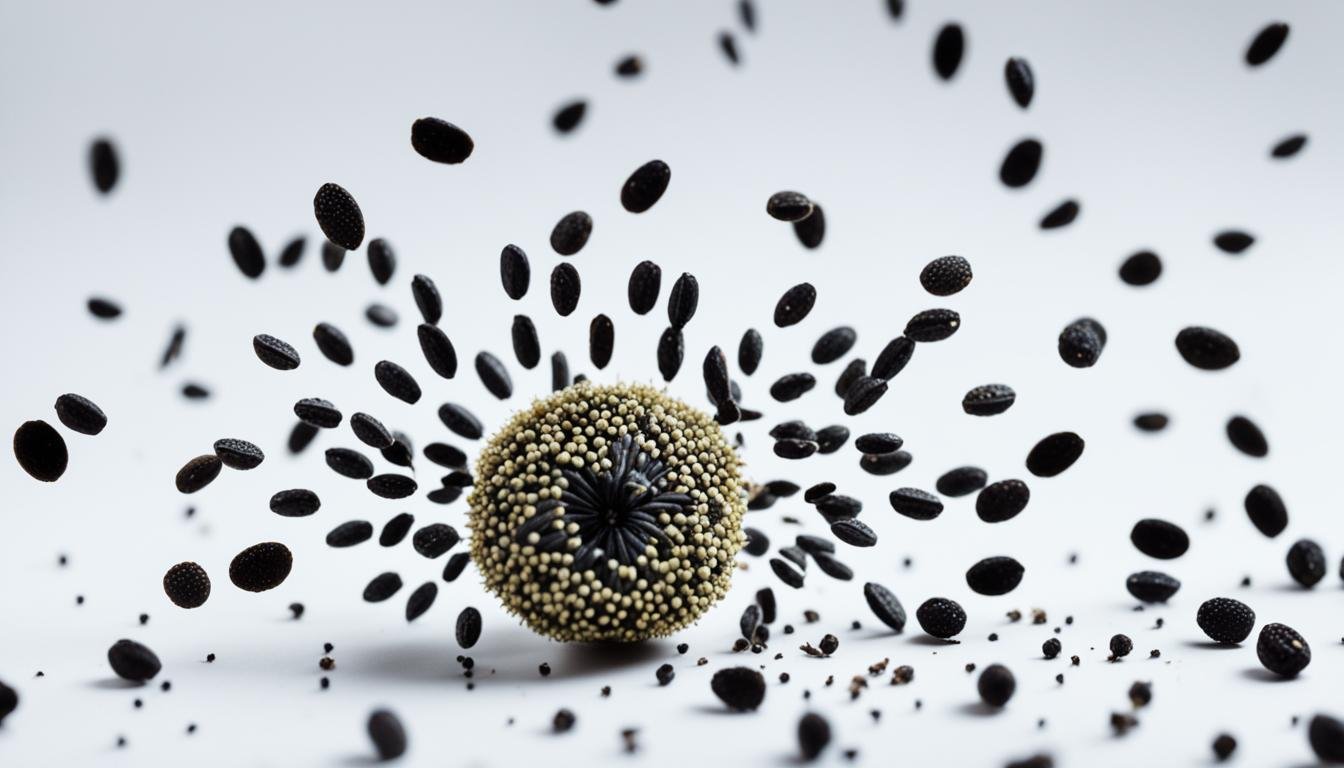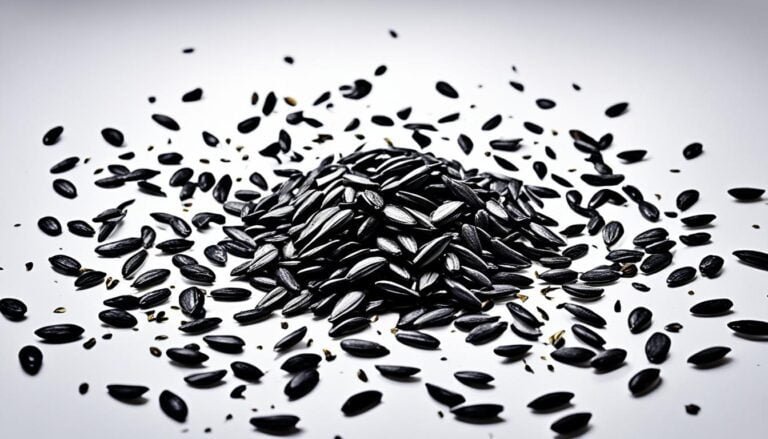Poppy Seeds Allergies: Symptoms and Management

Sesame, mustard, sunflower, and poppy seeds are common culprits of severe allergic reactions. Mustard seeds are especially troublesome. If you’re allergic to one seed, you might react to others too. This guide will cover the signs, diagnosis, and ways to handle poppy seeds allergies. It aims to keep you safe and well-informed.
Poppy seeds are found in many foods but can cause trouble for those allergic to seeds. Sesame seed allergies are on the rise, even though the FDA doesn’t make seeds list as allergens. So, it’s key for people with seed allergies to check food labels for seeds or seed products.
Introduction to Poppy Seeds Allergies
Poppy seeds allergies are a rare but serious condition. It happens when the body’s immune system overreacts to poppy seed proteins. This allergy can cause mild to severe symptoms. It’s important to know about poppy seed allergies to manage them well.
What is a Poppy Seeds Allergy?
A poppy seed allergy happens when the immune system sees poppy seed proteins as a threat. This can cause symptoms like hives, swelling, and trouble breathing. In severe cases, it can lead to anaphylaxis, a life-threatening reaction.
Prevalence and Risk Factors
Poppy seed allergies are not common. But, people with other food allergies might be more likely to have one. This includes allergies to sesame, kiwi, hazelnut, buckwheat, and rye. Jobs in bakeries or pharmaceutical factories can also increase the risk.
Some studies show that eating poppy seeds can lead to false positive drug tests. Another study found a link between poppy seed and buckwheat allergies in some people. This shows how complex food allergies can be.
Knowing about poppy seed allergies helps people manage their condition. It’s important to get medical help when needed.

Symptoms of Poppy Seeds Allergies
Allergic reactions to poppy seeds can be mild or severe. Some people may react to poppy seeds, even though they’re not a common allergen. Knowing what to watch for can help manage a poppy seed allergy.
Mild Reactions
Mild symptoms of a poppy seed allergy include:
- Itching or tingling in the mouth
- Skin rashes or hives
- Nasal congestion
These reactions happen when the body’s immune system reacts to proteins in poppy seeds. Proteins like profilins and seed storage proteins cause these reactions.
Severe Reactions
Severe symptoms of a poppy seed allergy can be:
- Swelling of the lips, tongue, or throat
- Shortness of breath
- Nausea and vomiting
Anaphylaxis is the most serious reaction. It’s a life-threatening condition that needs quick action and an epinephrine auto-injector. Anaphylaxis can make breathing hard and lower blood pressure.
People with a poppy seed allergy should always carry an epinephrine auto-injector. If they have anaphylaxis symptoms, they should use it right away. Getting medical help fast is key.

“Severe allergic reactions to poppy seeds, while not common, can be life-threatening and require immediate medical intervention.”
Knowing the symptoms of a poppy seed allergy is the first step in managing it. Being able to spot and handle both mild and severe reactions helps people with allergies live safely and confidently.
Poppy seeds allergies
Poppy seeds are often found in baked goods, dressings, and many dishes. For those with a poppy seed allergy, even a little bit can cause a bad reaction. This allergy is different from the poppy plant’s narcotic effects, which are used to make drugs. The proteins in poppy seeds that cause allergies are not the same as the drug-making parts, but they can still be dangerous for people with poppy seed sensitivity or poppy seed intolerance.
Poppy seed allergy is not common but can be serious for those who are sensitive to poppy seeds or related plants. Immunotherapy, like sublingual immunotherapy, can help reduce sensitivity over time. But poppy seeds are often in foods, so people with allergies must be careful about what they eat.
Those with a poppy seed allergy might have mild symptoms like itching and hives or severe reactions like anaphylaxis. Allergy drops, a type of at-home treatment, might work better than shots for this allergy.
| Potential Poppy Seed Allergy Symptoms | Severity |
|---|---|
| Itching, hives, swelling | Mild |
| Breathing difficulties, stomach issues, anaphylaxis | Severe |
For those with a poppy seed allergy, knowing where poppy seeds are in foods and products is key. Reading labels and being careful when eating out can help avoid bad reactions.

Poppy seed allergy can also happen by breathing in the seeds or touching related plants. This is a concern in places like pharmaceutical factories, where workers have had allergic reactions to poppy seeds and shells.
Dealing with a poppy seed allergy means avoiding the allergen, taking medicine, and possibly getting immunotherapy. By understanding the risks and being proactive, people with this allergy can live more safely and confidently.
Diagnostic Testing for Poppy Seeds Allergy
Diagnosing a poppy seeds allergy often means looking at medical history, doing skin prick tests, and blood tests. These tools, along with checking symptoms, help find the allergy and plan treatment.
Skin Prick Tests
Skin prick tests check if someone has an allergy to poppy seed proteins. A small poppy seed extract is put on the skin, and the reaction is watched. If there’s redness, swelling, or itching, it means the person is allergic.
Blood Tests
Blood tests, like the specific IgE test, check for poppy seed antibodies in the blood. This test shows how severe the allergy is and helps with treatment plans.
| Test Name | Sample Type | Report Time | Price |
|---|---|---|---|
| Allergen, Individual – Food Poppy Seed | Blood | 7 days | ₹1200 |
Poppy seed allergy might be linked to other seed or nut allergies, known as cross-reactivity. It’s key to work with a healthcare pro for the right diagnosis and care.

“Anaphylactic reactions can occur within seconds or minutes of exposure to an allergen, so it’s crucial to have a plan in place to manage severe reactions.”
Cross-Reactivity and Related Allergies
Poppy seeds can surprise people with food allergies. They’re used in many foods and can react with other plants like California and Mexican poppy. They also share proteins with birch, mugwort, and grass pollen. This means people allergic to poppy seeds might react to these foods and pollens too.
Potential Cross-Reactive Foods
Not all seeds react the same way, but some studies hint at connections. For example, poppy seeds might react with sesame seeds in some cases. Sunflower seeds can react with mugwort and other Compositae family members. But, we need more research to know how common these reactions are.
Studies show poppy seeds and sesame seeds react with each other. Sunflower seeds react with mugwort and others in the Compositae family.
A study with 36 patients found that poppy seed allergy is linked to four main allergens. These allergens also cross-react with hazelnut and buckwheat. This highlights the need to understand cross-reactions when dealing with poppy seed allergies.
Poppy seed allergy is not common, but knowing about cross-reactions is key. It’s important to manage all allergies for good health and well-being.
Managing Poppy Seeds Allergies
For those with a poppy seed allergy, avoiding the allergen is key. Always check food labels for poppy seeds. They can be in baked goods, dressings, and other foods. Be careful to avoid cross-contamination, as poppy seeds can touch other foods too. Always pay attention to what you eat and how it’s made to avoid allergic reactions.
Avoidance and Label Reading
Avoiding poppy seeds is key to managing a poppy seed allergy. Here are some tips to help:
- Look closely at food labels for “poppy seeds,” “poppyseed,” or “Papaver somniferum.”
- Be careful with baked goods like bread, pastries, and bagels, as they often have poppy seeds.
- Stay away from dressings, sauces, and marinades that might have poppy seeds.
- Ask about ingredients when eating out and tell the staff about your allergy to stay safe.
- Watch out for cross-contamination, as poppy seeds can touch other foods.
By reading labels and making smart food choices, you can handle your poppy seed allergy. This way, you can avoid harmful reactions.
“Strict avoidance of the allergen is the key to managing a poppy seed allergy. Vigilance and label reading are essential to prevent accidental exposure.”
Managing a poppy seed allergy takes effort and a focus on safety. By sticking to these tips, you can live confidently and reduce allergic reaction risks.
Treatment Options for Poppy Seeds Allergies
For those with a poppy seed allergy, it’s key to manage symptoms and prevent severe reactions. There are two main ways to do this: using antihistamines and epinephrine auto-injectors, or trying allergen immunotherapy.
Antihistamines and Epinephrine
If you react to poppy seeds, antihistamines can ease symptoms like itching, hives, or swelling. You can buy over-the-counter options like cetirizine (Zyrtec) or loratadine (Claritin). But for serious reactions, like trouble breathing or anaphylaxis signs, use an epinephrine auto-injector right away.
Keep an epinephrine auto-injector with you always if you’re allergic to poppy seeds. Know how to use it and be ready to act fast. After using it, get medical help right away because you might need more care.
Allergen Immunotherapy
For ongoing or severe poppy seed allergies, allergen immunotherapy might help. This method, also known as desensitization, slowly exposes you to small amounts of the allergen. Over time, it can make your allergic reactions less severe.
Sublingual immunotherapy is a type of this treatment for poppy seed allergies. You take the poppy seed extracts under your tongue at home. It’s a handy option for many people.
Always talk to a healthcare expert before starting allergen immunotherapy. They’ll watch over you and adjust the treatment to keep you safe and effective.
“Proper management of poppy seed allergies is essential to prevent life-threatening reactions and improve quality of life.”
Poppy Seeds Allergy in Occupational Settings
People working in places like bakeries or pharmaceutical factories face a higher risk of getting a poppy seed allergy. Being around poppy seeds can cause allergic reactions through breathing in dust or touching the skin. It’s important to use the right safety gear, control dust levels, and teach workers about the risks.
Bakers and workers in pharmaceutical factories are often at risk of poppy seed allergies. Research shows that being around poppy seeds at work can make allergies worse. A report told of a worker who had a severe allergic reaction after touching poppy seeds at their job.
Companies where poppy seeds are used must put their workers’ safety first. This means using systems to reduce dust, giving out masks, and teaching workers about allergy signs. These steps can help keep workers safe and lower the chance of allergic reactions at work.
| Occupation | Potential Exposure | Recommended Measures |
|---|---|---|
| Bakery Workers | Inhalation of poppy seed dust during handling, mixing, and baking | Ensure proper ventilation and dust extraction systems Provide respirators and other personal protective equipment Implement regular cleaning and housekeeping protocols |
| Pharmaceutical Factory Workers | Skin contact and inhalation during the processing of poppy plants for medication production | Establish engineering controls to minimize airborne particulates Require the use of gloves, gowns, and other protective gear Provide comprehensive training on hazard recognition and mitigation |
Employers can make the workplace safer by understanding the risks and acting on them. This helps protect employees from poppy seed allergies. Being careful and focusing on safety is key in jobs where these ingredients are common.
“Occupational exposure to poppy seeds poses a significant risk for the development of allergies, underscoring the importance of comprehensive safety protocols in industries where these ingredients are present.”
Precautions and Emergency Planning
If you have a poppy seed allergy, it’s key to have a plan for anaphylaxis. This plan should include using an epinephrine auto-injector right away, getting emergency medical help, and staying away from the allergen.
Always carry your epinephrine auto-injector with you. Tell your family, friends, and important people about your poppy seed allergy. Being prepared can greatly help in handling a severe allergic reaction to poppy seeds.
Anaphylaxis Action Plan
Here’s what your anaphylaxis action plan for poppy seed allergy should cover:
- Use your epinephrine auto-injector right away if you have severe allergic symptoms like trouble breathing, swelling, or a fast heartbeat.
- Call for emergency help or have someone call it for you.
- Stay calm and sit or lie down if you’re having trouble breathing.
- Avoid any more contact with poppy seeds.
- Get medical help, even if your symptoms get better, since a second reaction could happen.
Having a solid poppy seed allergy emergency plan means you’re ready to act fast and right if a severe allergic reaction happens.
“Food allergies affect 1 in 10 infants and about 2 in 100 adults in Australia. Proper training and education of food handlers can make a significant difference in preventing food safety incidents.”
Poppy seed allergy precautions and planning are crucial for your safety. Spend time making and checking your anaphylaxis action plan. This way, you’re always ready for a poppy seed allergy anaphylaxis situation.
Living with Poppy Seeds Allergies
Living with a poppy seed allergy can be tough, but there’s help available. Connecting with others who also have this allergy can offer great support and advice. It’s a way to share experiences and find ways to cope together.
Support Groups and Resources
Support groups, both online and in-person, are places where people with poppy seed allergies can talk and share tips. They offer a sense of community and help with coping strategies. These groups also keep people informed about new research and ways to make a difference.
There are also educational materials and groups focused on poppy seed allergies. These resources help people understand their condition better. They also support efforts to improve labeling and advocate for changes.
| Poppy Seed Allergy Support Resources | Description |
|---|---|
| The Food Allergy & Anaphylaxis Network (FAAN) | A leading advocacy organization providing educational resources, support, and information on managing food allergies, including poppy seed allergies. |
| Seed Allergy Support Group | An online community offering peer support, advice, and a platform for individuals with seed allergies, including poppy seeds. |
| Poppy Seed Allergy Awareness Blog | A blog dedicated to raising awareness, sharing personal experiences, and providing practical tips for living with a poppy seed allergy. |
Connecting with support groups and resources can really help people with poppy seed allergies. It gives them the support and advice they need. Together, we can make living with this allergy easier for everyone.
“Finding a community of people who understand the daily struggles of living with a poppy seed allergy has been a game-changer for me. It’s reassuring to know I’m not alone in this journey.”
Conclusion
Poppy seed allergies are rare but can be serious and even life-threatening. Knowing the symptoms, how to diagnose, and how to manage them helps protect you. By learning more and supporting each other, we can make life easier for those with poppy seed allergies.
This article highlights the need to watch what you eat and work with doctors. It also stresses the importance of staying updated on new research. With the right information and support, people with poppy seed allergies can live better.
You’re not alone in facing this challenge. There are groups and communities working to help those with poppy seed allergies. By being proactive and advocating for your health, you can beat the odds and live fully.
FAQ
What is a poppy seeds allergy?
A poppy seeds allergy is a rare condition where the immune system overreacts to poppy seeds. This can cause mild to severe symptoms.
What are the symptoms of a poppy seeds allergy?
Symptoms range from mild, like itching or skin rashes, to severe, including swelling and trouble breathing. Other symptoms include nausea and vomiting.
How common are poppy seeds allergies?
Poppy seeds allergies are not well-studied, but they might be more common in people with other food allergies. Workers in bakeries or pharmaceutical factories could also be at risk.
How is a poppy seeds allergy diagnosed?
Doctors use a mix of medical history, skin tests, and blood tests to diagnose this allergy. Skin tests check for IgE antibodies, while blood tests measure specific antibodies.
Can poppy seeds cross-react with other foods and pollens?
Yes, people with a poppy seed allergy might also react to other plants like California poppy and birch pollen. This means they could have allergic reactions to these foods and pollens too.
How can a poppy seeds allergy be managed?
Managing this allergy means avoiding poppy seeds and being careful with food labels. If allergic reactions happen, antihistamines or epinephrine auto-injectors might be needed. Allergen immunotherapy could also be an option for severe cases.
Are there any occupational risks associated with poppy seeds allergies?
Yes, people working with poppy seeds, like in bakeries or pharmaceuticals, face a higher risk of allergy. Using protective gear and training at work can help reduce these risks.
What should individuals with a poppy seeds allergy do in case of an emergency?
Have an anaphylaxis plan ready, which includes using an epinephrine auto-injector and getting emergency help. Always carry the auto-injector and tell others about the allergy.
Where can individuals with a poppy seeds allergy find support and resources?
Joining support groups and using resources can offer emotional support and advice. Educational materials and advocacy groups help spread awareness and push for better labeling and laws.







3 Comments